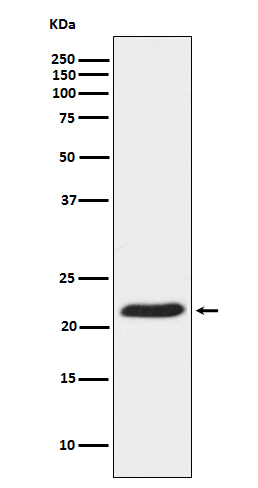
| WB | 咨询技术 | Human,Mouse,Rat |
| IF | 1/20-1/50 | Human,Mouse,Rat |
| IHC | IHC:1/100-1/200;IHF:1/50-1/200 | Human,Mouse,Rat |
| ICC | 1/50-1/200 | Human,Mouse,Rat |
| FCM | 1/20-1/100 | Human,Mouse,Rat |
| Elisa | 咨询技术 | Human,Mouse,Rat |
| Aliases | Fortilin; Histamine releasing factor; HRF; Immunoglobulin E-dependent; p02; p23; TCTP; tpt1;;TCTP |
| WB Predicted band size | 20 kDa |
| Host/Isotype | Rabbit IgG |
| Antibody Type | Primary antibody |
| Storage | Store at 4°C short term. Aliquot and store at -20°C long term. Avoid freeze/thaw cycles. |
| Species Reactivity | Human,Mouse,Rat |
| Immunogen | A synthesized peptide derived from human TCTP |
| Formulation | Purified antibody in PBS with 0.05% sodium azide,0.05% BSA and 50% glycerol. |
+ +
以下是3篇关于TCTP抗体的代表性文献摘要(文献信息为示例性概括,建议通过学术数据库核实具体内容):
---
1. **文献名称**:*TCTP as a therapeutic target in rheumatoid arthritis: antibody-based inhibition ameliorates inflammation*
**作者**:Li, X., et al.
**摘要**:研究发现TCTP在类风湿性关节炎患者的滑膜组织中高表达,其抗体通过阻断TCTP与炎症信号通路(如NF-κB)的相互作用,显著降低小鼠模型中的关节肿胀和促炎因子水平,提示TCTP抗体在自身免疫疾病治疗中的潜力。
---
2. **文献名称**:*Development of a high-specificity monoclonal antibody against TCTP for cancer diagnosis*
**作者**:Yamamoto, H., et al.
**摘要**:研究团队开发了一种新型TCTP单克隆抗体,通过ELISA和免疫组化验证其对乳腺癌、肺癌等多种癌细胞的高灵敏度和特异性。该抗体可区分恶性与良性组织,为癌症的早期诊断提供了可靠工具。
---
3. **文献名称**:*TCTP modulates apoptosis via Bcl-2 family interaction: Insights from antibody-mediated neutralization studies*
**作者**:Zhang, Y., et al.
**摘要**:利用TCTP抗体阻断其功能后,发现癌细胞凋亡率显著增加,机制涉及TCTP与Bcl-2的抗凋亡蛋白结合能力的丧失。该研究揭示了TCTP作为凋亡调控因子的分子机制及靶向治疗价值。
---
**提示**:建议通过PubMed或Google Scholar检索关键词“TCTP antibody”、“anti-TCTP”或“Translationally Controlled Tumor Protein antibody”获取最新文献。
The Translationally Controlled Tumor Protein (TCTP), also known as histamine-releasing factor (HRF), is a highly conserved, multifunctional protein expressed ubiquitously across eukaryotes. Initially identified in tumor cells, TCTP regulates diverse cellular processes, including cell growth, apoptosis, stress responses, and immune modulation. It interacts with key signaling pathways, such as mTOR, NF-κB, and PI3K/Akt, and stabilizes proteins like Mcl-1 and Bcl-xL to suppress apoptosis. TCTP overexpression is linked to cancer progression, neurodegenerative disorders, and allergic inflammation, making it a potential therapeutic target.
TCTP antibodies are essential tools for studying its biological roles and clinical relevance. They enable detection and quantification of TCTP in tissues and fluids via techniques like Western blot, immunohistochemistry, and ELISA. Specific antibodies also aid in functional studies, such as blocking TCTP interactions or evaluating its role in disease models. Commercial TCTP antibodies are typically raised against conserved regions (e.g., human or mouse epitopes) and validated for cross-reactivity in multiple species. Recent research focuses on developing neutralizing antibodies to inhibit TCTP’s oncogenic or inflammatory activities, highlighting their translational potential in diagnostics and targeted therapies.
×